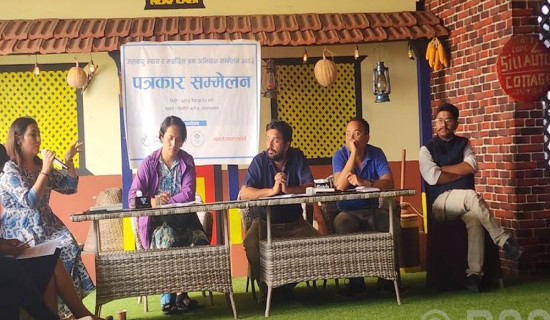- Saturday, 3 May 2025
Modernity pushes Feri practice towards disappearance
By Baburam Karki,Barahkshetra, Apr. 2: The traditional practice of performing ‘Feri’ (blowing animal horn, which produces the sound similar to conch, in each house by visiting villages in the night) ritual has been declining.
This custom primarily carried out by the men from the minority Jogi community during the months of Kartik and Chaitra, is gradually fading away as the younger generation of the community hesitate to continue the occupation.
According to the traditional beliefs, the Feri ritual has been performed for generations by the Jogi community to ward off evil spirits. However, with the younger generation showing little interest in continuing this profession, there are growing concern about its existence.
Sharing his concerns over the survival of the practice, Devi Bahadur Jogi, a 48-year-old local of Damak Municipality-2, said the younger generation of the community were showing less interest in their ancestral profession.
Jogi, who has been practicing the ritual since he was 11 years old, recalled, “My father and grandfather taught me this ritual from a young age. It became our livelihood.”
However, he said that younger generations now have more career choices, leading to a decline in interest in their ancestral profession.
Those who practice Feri ritual rely on the offerings collected in the morning from the households where they blew the horn the previous night. Through these offerings they sustain their families for the entire year.
Devi Bahadur, who arrived in Sunsari from Bhojpur in the last week of Falgun, especially for Feri, plans to continue the practice throughout Chaitra in various villages across Sunsari.
He informed that the performing the ritual is challenging, involving walking through villages at midnight, chanting mantras and performing the rituals at the four corners of each household while carrying a stick, light and an animal horn to play music.
“When everyone else is asleep, we sacrifice our rest and perform Feri without caring our discomfort. After completing the ritual, we go back in the morning to collect the offerings,” he said.
“But younger people today do not want to dedicate themselves to such difficult work,” he added.
Traditionally, it is believed that donating sida (offering items such as rice, lentils, potatoes and oil) during two months of Chaitra and Kartik removes planetary obstacles and brings peace and prosperity.
However, with limited awareness among newer generations, the offerings collected after a night of hard work are no longer sufficient to sustain, he lamented.
He further said that although it was difficult to abandon a profession inherited from his forefathers, the practice was becoming increasingly unsustainable.
“The Jogi community, dedicated to preserving its culture and profession, is also not satisfied with the return from the occupation,” said Devi Bahadur.
“For nearly five decades, I have been actively performing Feri to keep this tradition alive. Despite the demanding nature of the work, he finds it’s hard to quit as it has been part of his life since childhood. He believes that with government support, the profession could be preserved.
Since those who are educated tend to move to cities looking for employment opportunities, their interest in this traditional profession has declined.
However, Ram Yogi, a local of Barahkshetra-10, stressed that Feri is not merely an occupational but also a practice deeply rooted in the faith of local communities.
“Hearing the sound of Feri has a psychological impact, bringing a sense of peace,” he said.
He stressed the importance of preserving this tradition to pass it to future generations.
‘The midnight chanting and sound of Feri are believed to protect households from evil spirits and misfortunes,” he added. He also asked for state intervention to support the continuation of the practice.
As per the beliefs, performing Feri by walking around each house and chanting mantra at its four corner will remove evil spirits, witches and other supernatural powers.
















